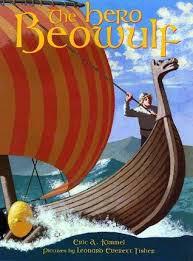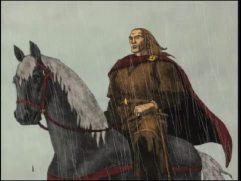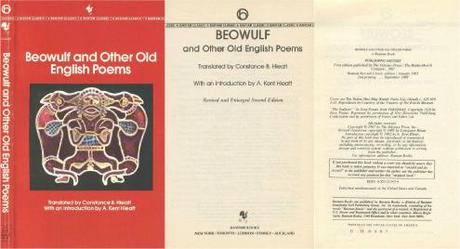I have a confession: I never read Beowulf in high school. Or college. I read Canterbury Tales more times than I can count (yet only remember a handful of the stories). I read Sir Gawain and the Green Knight ad nauseum – and I like that story. But no Beowulf. How did I miss it?
I’ll tell you how, we tried to cram so much into such a short amount of time. We spent hours and hours in school, but spent very little time actually studying. Somewhere along the way, Beowulf was lost to me. I’m not sure if I was ever really exposed to it or not. It might have been something I breezed through in a Norton Anthology and regurgitated the next day for a pop quiz, only to be quickly forgotten. I couldn’t tell you. I only know that I had a vague idea that it was an epic poem involving something named Grendel when I began working at a bookstore as an adult. Even then, I couldn’t tell you if Grendel was the monster or the man.

And we did. I read her the picture book shortly before my trip to Atlanta. It fit right in with all the Celtic and Norse mythology we’ve been reading to bridge the gap between the ancient times and our exciting year ahead. “What a guy! He tore off the monster’s arm! I can’t even do that,” she exclaimed. She was very pleased that this particular picture book could give the story in “one-sitting, all today” as opposed to the stories of Odysseus and Troy which all took weeks of chapter by chapter to finish. I foresee reading this again and again over the coming months, she loved the story so much; I have to admit, I did too.

Naturally, I was curious as to the accuracy of these versions. I won’t ever truly know, because everything is a translation, but I thought I’d give an adult version a go. There’s so many versions out there, I think I’ll just try a different one every Middle Ages cycle. So I took the Constance B. Hieatt version with me to Atlanta and enjoyed it immensely, especially the little extras at the end.

The kiddo, of course, keeps asking me why we are using “fake stories as lesson books, they aren’t real stories mother!” I keep telling her, very ineloquently, that these stories help us understand the people who told them. Read them to her as bedtime stories and naturally she’s thrilled at the excitement of them.
We’ll collect more versions over the years and by the time she is grown she will know the story well – and remember it. Next go around we’ll even tackle it in poem form, and eventually we’ll read Gardner’s Grendel.
Do you have any favorite versions of Beowulf? Or, more importantly, do you know any great stories of the time period that should not be missed?
